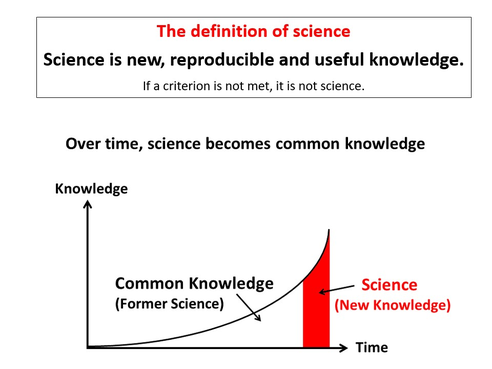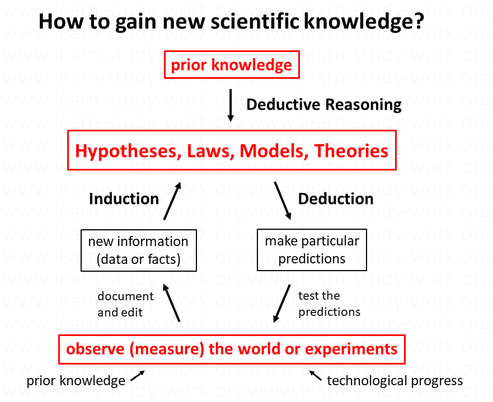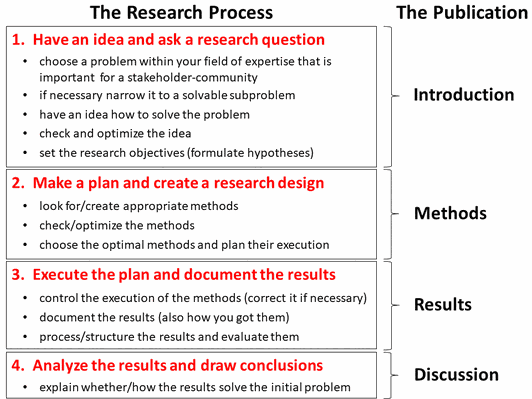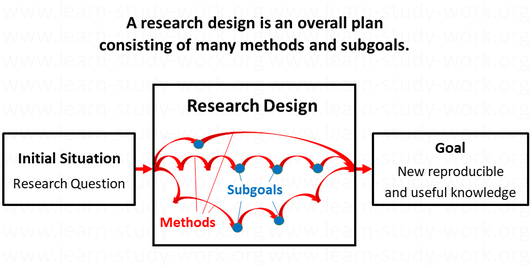What is Science? What is Research?
Key message: Science is new, reproducible and useful knowledge. Science and research are very useful when they help to solve urgent problems.
What is the origin of science and research?
Human beings try to satisfy their needs e. g. for energy, shelter or reproduction. Human beings are special because with their superior knowledge they can improve their living conditions considerably. This is why they are attempting to expand their knowledge. In addition the human curiosity is satisfied by finding new knowledge.
"Science is valued by society because the application of scientific knowledge helps to satisfy basic human needs and improve living standards." (www.ncbi.nlm.nih.gov/pmc/articles/PMC4198034, 21.08.19)
The word science comes from the Latin word "scientia", meaning knowledge. Scientist do research. Research is the attempt to discover new knowledge.
"Let us try to understand by what reasoning we can call a work scientific. We can still take as a model the natural sciences as they have been defined since the beginning of the modern period. In this sense, research is scientific when it fulfills the following conditions:
- The research deals with a specific object, defined so that others can identify it. ...
- The research says things that have not yet been said about this object, or it revises the things that have already been said from a different perspective. ...
- The research is useful to others. ...
- The research provides the elements required to verify or disprove the hypotheses it presents ..." (Umberto, Eco (2015). How to Write a Thesis. The MIT Press, page 27-30)
Point 1 and point 4 say the same thing: Point 1 does not need to be mentioned because it
is not possible to test a hypothesis (point 4) that cannot be precisely "identified". So three points remain:
Definition: Science is new, reproducible and useful knowledge.
(If one criterion is not met, it is not science.)
Definition: Research is the search for new, reproducible and useful knowledge.
Not all
people are scientists. What distinguishes them from other people?
Definition: Scientists conduct research, i.e. they search for new, reproducible and useful knowledge.
Reproducibility means that other scientist can achieve the same results with the same methods (logic) as in the original work. This requires that these methods have been described in sufficient detail.
A different definition (without the requirement that the new knowledge should be useful):
"Science is a systematic enterprise that builds, organizes, and shares knowledge in the form of testable explanations and predictions about nearly everything in the Universe." (Chang M (2014) Principles of Scientific Methods. CRC Press, Taylor & Francis Group)
Why is science useful knowledge?
"… if we lived in an unpredictable world, where things changed in random or very complex ways, we were not be able to figure things out. But we live in an … universe, where things change, but according to patterns, rules, or as we call them, laws of nature. … And so it becomes possible to figure things out. We can do science, and with it we can improve our lives." (Sagan, C. (2013). Cosmos. New York: Randon House Publishing Group, p. 41)
Knowledge is useful when we can use it for explanations and predictions to improve our lives. When a scientist finds very useful knowledge, knowledge that can improve many lives, knowledge with a
"substantial impact", she or he gets the Nobel Prize, watch this video:
"How to win the Nobel Prize? Part1: criteria" (www.chemistryworld.com/opinion/how-to-win-the-nobel-prize-part-1-criteria/1017510.article, 24.08.19)
"A frequently mentioned aim of science is prediction and control. But prediction and control cannot be accomplished without something on which to base predictions or formulate controlling actions. It is the role of laws ... to provide such a base." (Gomm, R., Hammersley, M., & Foster, P. (Eds.) (2000). Case study method, key issues, key texts. London: Sage, p. 27)
To find useful knowledge it is important to apply the relevant facts and the right rules (laws) for each situation.
"One point that should be noted is that what is needed in science is not just facts but relevant facts. The vast majority of facts that can be established by observation, such as the number of books in my office or the colour of my neighbour's car, are totally irrelevant for science, and scientists would be wasting their time collecting them. Which facts are relvant and which are not relevant to science will be relative to the current state of development of that science." (Chalmers, A. F. (1999). What Is This Thing Called Science? Open University Press, p. 27)
When a scientist publishes new knowledge, she should discuss the usefulness that this new knowledge has or could have. When science is useful, it motivates scientists to continue their research. Sometimes the real usefulness of a new finding only becomes apparent in the future.
But there are scientists (like Poincaré or Jacobi) who see the importance of benefits differently:
"Poincaré once turned with striking sharpness against Tolstoi, who had declared that the demand 'science for the sake of science' was foolish. 'Should we,' Tolstoi had said, 'be guided in our choice of occupation by the whim of our curiosity? Would it not be better to decide according to usefulness, that is, according to our practical and moral needs?' ... Poincaré argues against Tolstoi that if one had followed Tolstoi's recipe, science would never have come into being at all. ... When the famous Fourier once said, the main purpose of mathematics lies in the explanation of natural phenomena, it is Jacobi who dismisses him with all the passion of his temperament. A philosopher like Fourier should have known, Jacobi exclaims, that the honor of the human spirit is the sole purpose of all science ..." (Hilbert, D., & Hilbert, D. (1935). Naturerkennen und Logik (pp. 378-387). Springer Berlin Heidelberg. www.psiquadrat.de/downloads/hilbert_naturwissenschaft1930.pdf, p. 963, 09.03.24)
Is science “true” knowledge?
Is science true because it is derived from objective facts? Objective facts can not prove that science is true because the observation of facts can change in the light of new knowledge and through the use of new technology. Even if the facts should be objective their interpretation may change.
"If observation of the world is carried out in a careful, unprejudiced way then the facts established in this way will constitute a secure, objective basis for science.[?] ... Both [1] the fact
that our perceptions depend to some extent on our prior knowledge and hence on our state of preparedness … and [2] the fact that observation statements presuppose the appropriate conceptual
framework … indicate that it is a demand that is impossible to live up to." (Chalmers, A. F. (1999). What Is This Thing Called Science? Open University Press, page 1)
The first human beings derived their knowledge from observations. From then on prior knowledge and observation interact to produce new knowledge (new theories).
"Falsificationists freely admit that observation is guided by and presupposes theory. They are also happy to abandon any claim that theories can be established as true or probably true in the
light of observational evidence. … Once proposed, speculative theories are to be rigorously and ruthlessly tested by observation and experiment. Theories that fail to stand up to observational
and experimental tests must be eliminated and replaced by further speculative conjectures. … Only the fittest theories survive. Although it can never be legitimately said of a theory that it is
true, it can hopefully be said that it is the best available …" (Chalmers, A. F. (1999). What Is This Thing Called Science? Open University Press, page 60)
Science is new knowledge and new knowledge is still uncertain. It is not relevant whether knowledge is true. Relevant is whether this knowledge is actually the most useful one.
"If the results of a study do not reject the existing hypothesis, the hypothesis … persists, but one cannot be sure that it is correct—it just represents the currently best available explanation
until it is rejected and replaced by a better one. Failure to reject a hypothesis must not be interpreted as verification of that particular hypothesis …" (Starck J.M. (2017) How Science Works.
In: Scientific Peer Review. essentials. Springer Spektrum, Wiesbaden)
Why is science new knowledge?
It is important to repeat research (observations, experiments, studies) to confirm or falsify (= to prove something false) the new knowledge. But over time, new knowledge is transformed into common knowledge. Common is what was new knowledge in the past but now most people know.
"Generally, common knowledge is information that someone finds undocumented [without citation] in at least
five credible sources." (https://owl.purdue.edu/owl/research_and_citation/using_research/avoiding_plagiarism/common-knowledge_attribution.html,
05.10.20)
So every information you find in general references sources (dictionaries, encyclopedias, ...), school books and textbooks without citation is common knowledge.
"Ideas, findings, and methodologies that are new knowledge (and therefore specialized rather than common knowledge) become old knowledge more quickly in the sciences." (https://poorvucenter.yale.edu/writing/using-sources/understanding-and-avoiding-plagiarism/common-knowledge, 08.10.19)

To repeat common knowledge is not a great achievement unless you are a teacher. Before I write anything here on this website, I read a lot of literature. Although I use many quotations, I do not write the text as the sum of its sources, but I combine them in a way that something new is the result. I try to create new knowledge by deductive reasoning (see the figure below).
Why is science reproducible knowledge?
"... before an observation is accepted as factual, it must be confirmed. That is, other investigators must be able to repeat the observation, perhaps using different techniques and tests, and confirm independently that the original observer was accurate. Observations that do not stand this test of verification are not accepted as scientific fact. ... It is this restriction to verifiable observations that gives scientific information its reputation of being "exact", "factual" or "objective"." (Nebel, B. J., Wright R. T. (1993) Environmental Science: The Way the World Works. New Jersey: Prentice Hall, page 6)
Aristotle: "Of what is singular no science is possible." Scientists should discribe in sufficant detail how they gained their new knowledge and publish it. Then other scientists can reproduce and confirm or disprove the new knowledge.
How to gain new knowledge?
There are two ways to gain new knowledge: induction and deduction.
1. Induction
Induction is the process of interferring a general principle (a rule/pattern) from observing experiments or the world as it is. By observation or measurement a scientitist collects information (data). The collection is influenced by the actual state of knowledge and the actual state of technology. For induction scientists can use their own data or the data of other scientists. From the data the scientist infers a general principle. This general principle can be confirmed by observations or experiments of other scientists or by deductive reasoning.
2. Deduction
For deduction two definition exist.The Oxford English Dictionary definition of deduction is (1) "inference by reasoning from generals to particulars" or (2) "the process of deducing from
something known or assumed ..." To deduce means "to draw as a conclusion from something known or assumed, to infer". (http://citeseerx.ist.psu.edu/viewdoc/download?doi=10.1.1.586.1479&rep=rep1&type=pdf, page
3, 08.09.19) In the figure below the definition "decuding from something known" is called "deductive reasoning". In mathematics, scientists very often use deductive reasoning to proved new knowledge.

"As well as studying the problem of deduction in logic (that is, what follows from what), philosophers were also interested in the problem of induction (that is, generalising from instances). Induction is fundamental to an understanding of the philosophie of science, since much of science involves discovering general laws by generalising from experimental data." (Lloyd, J. W. (2003). Logic for learning. Springer-Verlag, p. 9)
What are Facts, Data, Information?
"A fact is an objective observation or measurement, verifiable by any trained observer." (Moores, E. M., Twiss, R. J. (2014) Tectonics. Long Grove: Waveland Press, page 248)
As with science, we cannot be sure that facts are true.
"In science, an observation that has been repeatedly confirmed and for all practical purposes is accepted as “true.” Truth in science, however, is never final and what is accepted as a fact today may be modified or even discarded tomorrow." (https://ncse.ngo/definitions-fact-theory-and-law-scientific-work, 20.10.19)
In some sciences facts are called data:
"Data is raw, unorganized facts that need to be processed. Data can be something simple and seemingly random and useless until it is organized. When data is processed, organized, structured or presented in a given context so as to make it useful, it is called information." (www.diffen.com/difference/Data_vs_Information, 20.10.19)
What are Rules, Laws, Theories, Hypotheses, Models?
Normal scientists don't like the word "rules". Instead they use words like principles, concepts, pattern, equations and natural laws.
"Scientific laws are similar to scientific theories in that they are principles that can be used to predict the behavior of the natural world. Both scientific laws and scientific theories are typically well-supported by observations and/or experimental evidence. Usually scientific laws refer to rules for how nature will behave under certain conditions, frequently written as an equation. Scientific theories are more overarching explanations of how nature works and why it exhibits certain characteristics." (Poulsen, T. (2010) Introduction to Chemistry. CK-12 Foundation, https://openedgroup.org/books/Chemistry.pdf, p. 15)
"... if an observation does not conform to the expectations of a scientific law, then either (1) the observation was illusory or interpreted incorrectly, (2) the observed event took place outside the specified conditions to which the law applies, or (far less likely), (3) the law is inaccurately formulated." (https://link.springer.com/article/10.1007/s12052-007-0001-z, 20.10.19)
"Scientists use the word “hypothesis” to describe an idea or model that has not yet been fully tested. ... If a hypothesis is supported by the evidence, the hypothesis may contribute to more complex explanations, including theories. If the available evidence does not support a hypothesis, that hypothesis can be rejected, modified, or subjected to further testing. For a hypothesis to fall within the realm of science, it must be constructed in such a way that it potentially can be shown to be wrong—otherwise the hypothesis cannot be tested against evidence from the natural world. This demand that a hypothesis be “falsifiable” is one of the defining characteristics of scientific explanations. ...
Because theories explain facts, they embody a greater understanding of the natural world than do observations. Without theories to explain and integrate them, facts become collections of unrelated observations." (https://www.ncbi.nlm.nih.gov/books/NBK208858/, 20.10.19)
A model is the simplified representation of reality. The representation can be a discription or a visualisation.
"... a model is a simplified description of certain aspects of reality, used for understanding, structuring, or predicting parts of the real world." (http://people.mpi-inf.mpg.de/~dstepano/KRSW/literature/SWTechnologies.pdf, 06.10.20)
Why is it necessary to do experiments?
"Many kinds of processes are at work in the world around us, and they are
all superimposed on, and interact with each other in complicated
ways. ... To acquire facts relevant for the identification and specification of the various processes at work in nature it is, in general, necessary to
practically intervene to try to isolate the process under investigation
and eliminate the effects of others. In short, it is necessary to do experiments." (Chalmers, A. F. (1999). What Is This Thing Called Science? Open University Press, page 28)
What is the research process?
A scientist has a field of expertise. Within this field she reads the current literature, listens to presentations of other scientists and works practically. In this way she knows the big and small problems in her field of expertise that need to be solved. For one of these problems she has an idea for an inquiry or for a solution. The origin of the idea are observations (in case of induction) or existing knowledge (in case of deduction). For this research idea she formulates a precise research question or research hypothesis. The answer to the question or the testing of the hypothesis is the goal of her research. Now she has two possibilities:
- She can study the existing knowledge and tries to answer her research question by "deductive reasoning".
- She collects her own data (observations, measurements) or uses existing data and tries to answer the question by "inductive reasoning".
Normally a scientist starts with the first possibility and conducts a literature review. When this is not successful she plans her own research project. For a project she sets up a research design (an overall plan). Finally she plans the details and conducts the methods to get the desired information (data). The data are documented by using words, figures, tables, illustrations and statistics and they are analyzed. From the data she draws conclusions and answers her research question. The following image shows the research process:

What is a research design?
A method is the way to a goal. For a simple goal, one method might be enough. If the goal is complex many methods have to be applied in a logical order and several subgoals must be achieved before it is possible to reach the final goal. A comprehensive plan is necessary. In research this plan is called “research design”.
“The conceptual phase is the initial phase of research and involves the intellectual process of developing a research idea into a realistic and appropriate research design. … The research design is the overall plan for conducting a study that will optimize the ability to achieve the study purpose and obtain accurate results.” (www.esourceresearch.org, Design Decision in Research: The Conceptual Phase - Page 4, The Design and Planning Phase - Page 11, 10.08.19)
“The term ‘design’ describes the overall plan and structure of a peace of research … A design can be regarded as the framework into which particular methods are fitted. … Research methods are the specific techniques employed in the execution of a piece of research.” (Sim J, Wright C (2000) Research in Health Care: Concepts, Designs and Methods. Cheltenham, UK: Nelson Thornes)

How to be a successful scientist?
As the above image shows, a research design is complex when it consist of many methods and many subgoals. In addition, each method can consist of many steps. To develop and execute a complex research design requires special skills. So what makes a scientist successful?
"1. Make new connections. Broaden yourself to more than one field. Read widely. Use analogies to link things together. ... Use visual as well as verbal representations. ... Use multiple methods. Seek novel mechanisms.
2. Expect the unexpected. Take anomalies seriously. Learn from failures. Recover from failures.
3. Be persistent. Focus on key problems. Be systematic and keep records. ...
5. Be sociable. ... Organize good teams. Study how others are successful. ... Listen to people with experiene. ... Communicate your work to others. ...
The first three classes all involve cognitive habits, that is ones tied to basic thinking processes of problem solving and learning." (Thagard, P. (2005). How to be a successful scientist, www.arts.uwaterloo.ca/~pthagard/Articles/successful.pdf, page 19, 20 and 3,11.02.20)
"Problem solving is one of the highest forms of mental activity we know. The problem solutions resulting from this activity have contributed significantly to the success (and thus survival) of the human species, ... To this day we know of no other creature besides humans on this planet who shape their lives in a comparable way through planned action and problem solving. However, this is no cause for unrestrained optimism in unlimited progress. These human capabilities also harbor the greatest destructive potential that has ever been observed in a species." (https://pdfs.semanticscholar.org/dca9/72cf40d3f8120481b218bf7621d630d433f7.pdf, 25.02.20, page 155)
Read on Learn-Study-Work: "How to solve problems", "What are scientific methods", "How to define words", "How to write a text", "What is Respect", "How to respond to disrespect", "What is Health"
en français: "Qu'est-ce que le respect ?", "Comment réagir à un comportement irrespectueux ?", "Comment écrire un texte ?"
en español: "¿Qué es el respeto?", "¿Como responder a la falta de respeto?"
हिंदी भाषा में: "सम्मान क्या है?", "अनादर का जवाब कैसे दें"
